|
|
|
Sort Order |
|
|
|
Items / Page
|
|
|
|
|
|
|
| Srl | Item |
| 1 |
ID:
178616
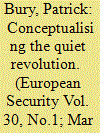

|
|
|
|
|
| Summary/Abstract |
There is growing evidence that simultaneous to the Revolution in Military Affairs (RMA), a less obvious, but equally profound, Revolution in Military Logistics (RML) has occurred that shapes and underpins western military effectiveness. However, there has been no conceptualisation of this RML nor its wider effect on Western force structures. This article addresses this gap in the security literature. Using an interdisciplinary literature review and case studies, it makes two central contributions: first, it details how western military logistics systems and practises have transformed following post-Fordist principles in the last two decades. In doing so, second, it contributes a major new conceptual framework to the military logistics and security studies literature. Finally, the implications of these processes for military effectiveness are examined, with the conclusion asserting that the cumulative effect of this post-Fordist RML has potentially increased western militaries’ strategic vulnerability.
|
|
|
|
|
|
|
|
|
|
|
|
|
|
|
|
| 2 |
ID:
178613
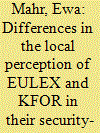

|
|
|
|
|
| Summary/Abstract |
This article compares the local perceptions of the EU Rule of Law Mission in Kosovo (EULEX) with those of NATO’s mission Kosovo Force (KFOR) and investigates the reasons for observed differences. It focuses on an oft-overlooked aspect of EULEX: its broadly defined security-related tasks. Until recently, EULEX could be seen as a prominent security actor, thanks to its robust police component and its function as a second respondent. EULEX coexists in Kosovo with KFOR; while the former is civilian and the latter military, both play complementary roles in the security realm and some of their tasks are similar. However, the local perceptions of EULEX and KFOR regarding their execution of security-related tasks have differed, with only KFOR enjoying local acceptance. This article argues that such differences are caused by the missions’ differently perceived powers over local actors, as manifested through their ability to exert compliance and cooperation from local actors through coercion, the ability to offer rewards and legitimacy. By going beyond the well-researched initial gratitude of Kosovo Albanians to NATO/US for intervening in 1999, this article offers a more fine-grained analysis of Kosovo Albanian and Kosovo Serbian perceptions of EULEX and KFOR.
|
|
|
|
|
|
|
|
|
|
|
|
|
|
|
|
| 3 |
ID:
178615
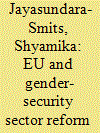

|
|
|
|
|
| Summary/Abstract |
This article is a contribution to critical International Relations scholarship on European Union foreign and security policy and to the debates on “Normative Europe”. It focuses on the ways in which the EU engages with their own gender equality policies in external Security Sector Reform (SSR) missions. By analysing visual materials of the European Union Advisory Mission-Ukraine (EUAM Ukraine) and European Union Capacity Building Mission in Sahel Mali (EUCAP Sahel Mali) missions, this article identifies the discrepancies between the EU’s proclaimed policy goals about gender equality and visual representations of women and men in the missions’ newsletter photos. These representations reflect a lacklustre approach and suggest a lack of commitment to practices of gender equality and positive role modelling in SSR’s day-to-day activities. This article suggests the EU-SSR missions overhaul their public communication strategies to focus first on “how” to communicate gender equality norms and only then on “what” to communicate. This study shows one concrete opportunity and space where this can be achieved.
|
|
|
|
|
|
|
|
|
|
|
|
|
|
|
|
| 4 |
ID:
178614
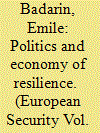

|
|
|
|
|
| Summary/Abstract |
This article examines empirical resilience interventions to demonstrate how resilience-building is utilised to govern in non-liberal settings and how its political and economic positionality shapes concrete resilience projects, processes of inclusion and exclusion and the hierarchies between them. It argues that the politics and economy that undergird resilience, coupled with the lack of freedom, render empirical resilience less fit for the purpose of governmentality in non-liberal and authoritarian conditions. In these circumstances, resilience-building governs through discipline. Resilience is structurally oriented towards pinpointed interventions directed at specific targets, subjects and fields. It unfolds as a hierarchal and top-down process, which positions local actors and concerns at the bottom. The inclusion or exclusion of subjects, objects and goals and the hierarchies that underpin empirical resilience are not inherent to specific resilience thinking, but rather derive from unfixed and contingent foreign policy rationalities and instruments. This contingency highlights the indeterminate nature of resilience, which opens space for contestation and decoupling. Resilience’s meaning and content are dependent on the dynamics of the foreign policy instruments. The policy-driven nature of resilience intervention renders its theorisation as a difficult challenge.
|
|
|
|
|
|
|
|
|
|
|
|
|
|
|
|
| 5 |
ID:
178617


|
|
|
|
|
| Summary/Abstract |
During the last decade, more than before, Germany has been pushed to take increasing responsibility for international affairs, including security, and move into a leadership position. Visegrad countries – the Czech Republic, Hungary, Poland and Slovakia – seem to be proper partners to follow German leadership as they are economically and in most cases politically tied to Germany. However, in recent years several discrepancies in the fields of soft as well as hard security have appeared between Germany and the Visegrad countries – most prominently the refugee crisis, Energiewende and the strengthening of collective defence military capacities on NATO’s eastern flank – substantially affecting the Visegrad countries’ readiness to be led by Germany. Having explored three policy areas where contestation appeared – migration policy, energy policy and the policy of NATO’s deterrence in Eastern Europe – we conclude that rather than as aleader, Germany is perceived as a source of unilateral pressure in Central Europe.
|
|
|
|
|
|
|
|
|
|
|
|
|
|
|
|
| 6 |
ID:
178612
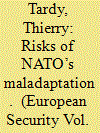

|
|
|
|
|
| Summary/Abstract |
This article deals with the process of adaptation that NATO has gone through over the last decade. It contends that while seeking congruence with its environment, NATO is facing a risk of maladaptation that pertains to its positioning as a defence or security actor. On the one hand, NATO has adapted by going back to the basics of deterrence and defence in the new Cold War context provoked by Russia’s annexation of Crimea; in the meantime though, this move has created tensions for the organisation as it had to simultaneously cope with an increasingly diverse security environment that tends to pull NATO away from a narrow defence-focused agenda. Whether NATO does defence or embraces a broader security agenda reflects dilemmas and trade-offs that are at the heart of the Alliance’s quest for relevance. This article explores NATO’s adaptation since 2014, unpacks the rationale, dilemmas and policy implications of the quest for congruence, and identifies vulnerabilities that the adaptation process may unintentionally lead to.
|
|
|
|
|
|
|
|
|
|
|
|
|
|
|
|
| 7 |
ID:
178611


|
|
|
|
|
| Summary/Abstract |
The decisions to impose sanctions on Russia and to lift them on Iran, in opposition to the wishes of the United States, contributed to the elevation of the profile of the European Union among the main global actors in international politics. However, the EU imposes sanctions since the spring of 1994, shortly after the entry into force of the Treaty of Maastricht. Even though the EU consequently has 26 years of experience herewith, EU sanctions have been mostly studied only on a case-by-case basis. The aim of this article is to provide an up-to-date and comprehensive overview of the experience of the EU with sanctions. Specifically, it presents the results of a newly constructed database of EU autonomous sanctions constituted by 48 cases of these restrictive measures, which have been subdivided in 85 episodes. The analysis revolves around four questions that we asked in each case: when sanctions were in force, what type(s) were used, where the targets were located and why restrictive measures were imposed. The analysis of the empirical database leads to observations about the EU as an international actor and, more generally, on the trends vis-à-vis the utilisation of sanctions as a foreign policy instrument.
|
|
|
|
|
|
|
|
|
|
|
|
|
|
|
|
|
|
|
|
|